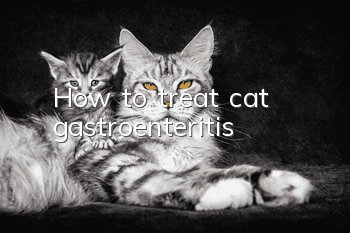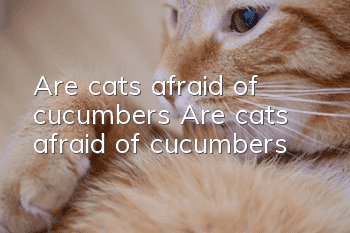How to treat cat gastroenteritis?

Cats are prone to gastroenteritis due to factors such as weather conditions, improper feeding, colds, frightened stress, and food poisoning. Many novice cat owners treat cats with gastroenteritis. The method used was wrong, and instead of curing the cat’s gastroenteritis, it worsened the condition and even killed the cat.
So, how to treat cat gastroenteritis? I will tell you some experiences below, hoping to give you some reference and stop using the wrong methods to treat cat gastroenteritis.
1. First, understand what gastroenteritis is
Gastroenteritis is inflammation of the gastric mucosa and intestinal mucosa. It occurs more frequently in cats and may be caused by a variety of reasons. Divided into two categories: acute gastroenteritis and chronic gastroenteritis.
High incidence periods and types:
Cats of all ages can develop gastroenteritis.
Kittens are more susceptible to gastroenteritis because their stomachs are very shallow and they are not very good at controlling their food intake. If they are not fed properly, they can easily cause gastroenteritis.
It is important to emphasize here that it is not recommended to feed cats milk, especially young cats, because many cats are lactose intolerant. They do not have lactose enzyme, so they cannot digest the lactose in milk, so they will drink milk after drinking milk. Soft stools or diarrhea may occur when the child is young, and may even lead to death. If the cat has not passed the weaning period, it is best to feed it special milk powder for pets.
2. What are the causes of gastroenteritis
1. Eating spoiled feed or frozen feed that is difficult to digest and overeating.
2. Drugs that are irritating to the gastrointestinal tract during feeding, such as aspirin, phenylbutazone, etc.
3. Secondary to other diseases, such as feline distemper, gastrointestinal parasites, peritonitis, pancreatitis, etc.
4. Ingestion of poisons, such as rat poison, arsenic, mercury, lead, phenol, etc. can cause it.
5. Lack of vitamins and minerals.
6. Bacterial infections, such as Salmonella, E. coli, etc.
3. What are the symptoms of gastroenteritis
Vomiting, depression, abdominal pain, and diarrhea are the main symptoms of this disease. In gastroenteritis, which is mainly gastritis, the sick cat will be depressed, have a slight increase in body temperature, loss of appetite, vomiting and abdominal pain. The sick cat showed abdominal contraction and constantly reviewed the abdomen. Another characteristic is a significant increase in thirst, but vomiting occurs after drinking water.
If gastroenteritis is caused by corrosive items, the vomitus often contains blood and gastric mucosal fragments. Sick cats often squat or lie on the cold ground or in a corner after vomiting. When touching the abdomen of sick cats, they often refuse to touch because of abdominal pain.
Gastroenteritis, which is mainly enteritis, has diarrhea as its main symptom. The stool is liquid and has a fishy and unpleasant smell. When enteritis is severe and the intestinal mucosa bleeds, the stool will be black or black-green, sometimes mixed with blood streaks and black blood clots.
The sick cat’s abdomen was tense and refused to be pressed or touched. During auscultation of the abdomen, bowel sounds can be heard that increase in the early stages of the disease and then decrease in the later stages. In the later stages, sick cats may show intestinal bloating and are prone to symptoms such as dehydration and acidosis. Diagnosis can be made based on the history of onset and clinical symptoms.
4. Treatment of gastroenteritis
Diagnosis: Feline acute gastritis is an acute inflammation of the gastric mucosa and is a common disease in cats and other small animals. The main cause is that cats overeat, or eat putrefactive food and indigestible bones, hair, plastic products, etc., which irritate the gastric mucosa and cause inflammation; taking certain irritating drugs or accidentally ingesting chemical substances are also causes of cat gastritis.
Certain infectious diseases and parasitic diseases can also cause gastritis. The sick cat suffered from vomiting, depression and abdominal pain. Feeling thirsty, but vomiting occurs after drinking water. If gastritis is caused by corrosive agents, the vomitus may contain blood and gastric mucosal fragments. Sick cats refuse to eat or are addicted to food, and appear uneasy due to abdominal pain. Dehydration may occur. The sick cat violently resists, feels restless and whines when its stomach is touched.
5. Prevention and health care
Misunderstanding 1: Some cases of diarrhea in cats can be treated by themselves. Just take a few tablets of berberine. Error!
Correction: Due to restrictions on domestic pet medical conditions, sometimes cats can also use human medicines. However, because cats and people are different, it is necessary to understand which medicines can be used and which medicines are toxic.
Therefore, when you use human medicine to treat cats on your own, you should first consult your veterinarian about which medicine can be used for emergency use in cats and what the dosage is. Safe medication is closely related to your cat’s health, so you must be cautious and cautious!
Myth 2: Cats can make their own sick meals during recovery, such as rice soup, which is nutritious and cheap. Error!
Correction: Nutritionally safe and easy-to-absorb pet prescription food is what cats need during their illness. Long-term consumption of rice soup or porridge will cause nutritional deficiencies.
Don’t rely on our own imagination to determine a cat’s needs, or use human experience to deal with problems. Rice soup is a good sick meal for humans, but it is wrong for cats who need a lot of protein and are likely to have no appetite during their illness.
Misunderstanding 3: Cats cannot keep up with their nutrition after diarrhea, so they should eat quickly to replenish energy. Error!
Correction: Fasting is required in the early stages of treatment, otherwise repeated gastrointestinal irritation will aggravate the condition. Fasting can give the gastrointestinal tract a good rest and help the gastrointestinal mucosa slowly repair. Because when the gastrointestinal tract function is disordered, feeding food will cause abnormal fermentation, causing the food to be abnormal.Normal digestion can cause aggravation of damage to the digestive tract, leading to serious gastrointestinal diseases and even pancreatic problems.
- What medicine should I take if my cat has sticky drool?
- How long does it take for a frightened cat to recover from paralysis of its hind legs?
- Why does a cat meow like a child crying?
- How to feed a two-month-old kitten
- How to train a cat to obey what you say? To train a cat, you must first understand the cat!
- What should I do if my cat won’t eat or drink after being neutered?
- What will happen if the cat doesn’t dry it after taking a bath?
- How to Treat Cat Ringworm in American Bobtail Cats
- Have you heard that Ragdoll cats are artificially bred species? Introduction to Ragdoll cat breeds!
- What should I do if my newborn kitten is in danger?



